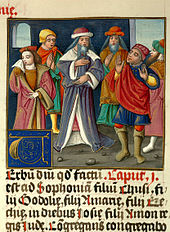1} warnings against Judah and the Philistines
2} the fall of Nineveh
3} promised salvation and a blissful future
Warnings Against Judah and the Philistines
Zephaniah spoke boldly against the religious and moral corruption of the day. In view of the idolatry, which had even encroached the sanctuary, he warned that God would "destroy out of this place the remnant of Baal, and the names of the ... priests" (Zeph 1:4). The zealous prophet earnestly pleaded for a return to the simplicity of their fathers instead of the luxurious foreign clothing which was worn - especially in aristocratic circles (Zeph. 1:8).
The ancient prophet warned about the "Day of the Lord", which the Creator espoused a judgment upon the people, promising to descend on Judah and Jerusalem as a punishment for their degeneracy in religious life (Zeph. 1:4-7). The admonishment would extend to all classes of people. Zephaniah implored the people to repent and seek the Lord (Zeph. 2:1-3). To bring his point to light, he informed those who would listen that not only Jerusalem, but the entire territory would be subject to judgment, including the Philistines (Zeph. 2:4-7), Moabites, Ammonites (Zeph. 2:8-11), Ethiopians (Zeph. 2:12), Assyrians and Ninevites (Zeph. 2:13-15).
The Fall of Nineveh
The Median army overtook Tarbisu, near Nineveh and encamped nearby, and then attacked the city of Nineveh. The Babylonian text recounted how, in 612 B.C., their allies destroyed Nineveh's temples and sacked the city. The Assyrian King, Sin-shar-ishkun, was killed in the siege.
Later that same year, the Babylonians once more mustered their army and joined forces with Cyaxares encamping against Nineveh again. They laid siege to the city for three months and finally broke the defenses, plundering the city and burned it. While the opposing army declared that Ashur-uballit II (king in Nineveh) bow down in vassalage, he refused to submit. However, the king successfully fought his way out of Nineveh. Ashur-uballit II founded a final capital at Harran.
There would be several more campaigns against Assyria by the Neo-Bablyonians and their allies, including one against an allied Egyptian-Assyrian army. Thus while the Battle of Nineveh was a turning point in the war, Ashur-uballit II would fight on for several more years.
According Nahum, one of the 12 Minor Prophets who prophesied a few decades before Zephaniah, the battle went on for months. Nahum's text, written between 660-630 B.C., made his predictions [in Chapter 2] especially prescient for what happened in 613-605 B.C. Nahum also predicted that the city [Nineveh] will not be rebuilt; archaeological work shows that it was left as a place of desolation and ruin.
The fall of Nineveh occurred just as Zephaniah had predicted.
Salvation and A Blissful Future
 |
| Zephaniah addressing people (France, 16th century) |
Zephaniah, whose lineage is linked to the godly kings and the godly remnant of Israel's history, faithfully ministered to ancient Jerusalem. His prophetic warnings were direct, holding promises of wrath and doom, yet he also declared that the Creator would one day bring about a glorious future for those who remained faithful to God's covenant with King David.
This mysterious announcement of receiving a glorious reward, among the gloom and doom of his ministry, gave a prophetic glance at the Kingdom of God [in the future]. Turning to God, the world will be united and the prosperity of the Messianic Kingdom will be enjoyed by those who remain steadfast and obedient to God.
The final message of the prophet exemplifies a subtle Messianic connection; the message about the "Day of the Lord" went beyond Zephaniah's time and the divine judgment at the hands of Nebuchadnezzar. The ancient prophet was speaking of a future time, which correlates with Daniel's 70th week (Zeph. 1:18; 3:8). The expression "Day of the Lord" is described as a day that is near (Zeph. 1:7), and as a day of wrath, trouble, distress, devastation, desolation, darkness, etc. (Zeph. 1:15-16, 18). While not as detailed, the correlation is comparable to the prophecies of Isaiah (a Major Prophet) in which it proclaims the promise of an eventual salvation for His believing remnant (Zeph. 2:7; 3:9-20).
`````````````````````````````````````````````````````
The purpose of Zephaniah’s prophecy is to set forth what the "Day of the Lord" will mean to the ungodly tribe of Judah, to the world powers (Zeph. 1:2 – 3:7), and to the godly remnant of Israel (Zeph. 3:8-20). His theme focuses on the "Day of the Lord", which destroys the false remnant of Baal (chapter 1), eradicates the God-rejecting nations (Chapter 2), and purifies the true remnant (Chapter 3).
No comments:
Post a Comment